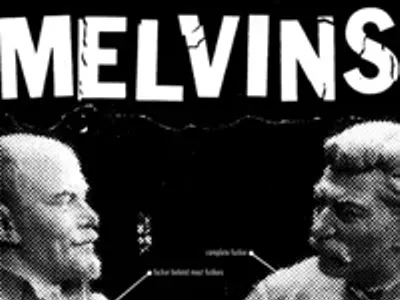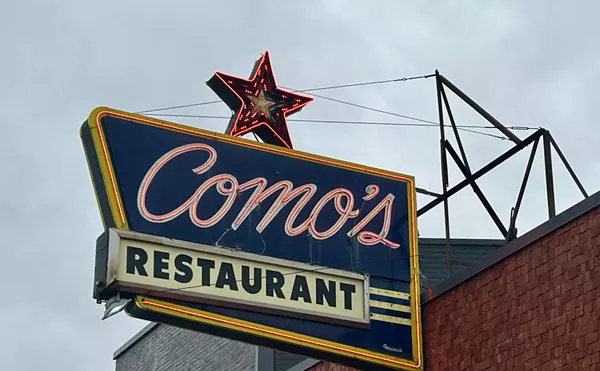
Audio By Carbonatix
[
{
"name": "GPT - Leaderboard - Inline - Content",
"component": "35519556",
"insertPoint": "5th",
"startingPoint": "3",
"requiredCountToDisplay": "3",
"maxInsertions": 100,
"adList": [
{
"adPreset": "LeaderboardInline"
}
]
}
]
First, the scoundrels. Namely, the leaders of the Democratic and Republican parties, who combined to try to run a scam on the voters and the taxpayers to get you to pay to create shakedown lists for them.
I'm not kidding, either. That's exactly what happened. Here's what they did and how they did it to you: Remember the primary we were supposed to have Jan. 15? Last week, a judge correctly declared it unconstitutional.
That did us all a big favor, even the nitwit politicians. I had no idea before how corrupt and bad this year's way-too-early primary was until that. Sure, I had criticized the primary plenty. It violated both parties' rules and was going to cost the state delegates and clout at both national conventions.
The farce was greatest on the Democratic side, so much so that eventually most of the candidates took their names off the ballot. I couldn't understand why both parties were still hot to go ahead with it. Silly me.
Although my slings and arrows were valid, I was a mere naïf. My trouble was that I hadn't read the bill establishing the primary, a bill the legislators — the guys who, after a year, can't balance a budget — rammed through in mere days. Turns out I was only looking through the front window of Don Corleone's Olive Oil and Cement Overshoe business.
Want outrage? This is how the Michigan primary was supposed to work. The state would pay $10 million or more to hold the election, but to the politicians, what really mattered was not who eventually wins.
What this really was about was using state money to create a gold mine of precious information for the parties. Voters in the primary would have to declare what party they wanted to play in, and the state would then make a list of them, sorted by party, name and addresses.
This list would then be kept secret ... from all of us.
But it would be turned over — for free — to the two political parties, who would not have to pay a dime for the expense of gathering it.
They would be able to use it for "supporting political activities." This means, in modern-day language, shaking down people for money. You might suppose, however, that any other citizen could get a copy of that list too.
Legally, how could it be otherwise? After all, taxpayer money paid for it.
You poor fools. How dare you think that the politicians want you to share in something they are spending your money on? Our job is only to fill their trough, and then stay the hell away while they eat. They made it illegal for anyone to have these lists — except them! As Phil Power, founder of the nonpartisan Center for Michigan noted, the law provided that any other use — "political, commercial, journalistic, academic, historical or scientific — by anyone else other than the two major political parties is a violation of the law."
They even wrote the law so that — get this — attempting to exercise your right to try to see a political list compiled with taxpayer money could get you a $1,000 fine, and up to 93 days in jail.
Now you would think a really bright beginning law student or maybe even a reporter would have had doubts about whether this was legal under either the state or the federal constitutions. You would surely think Mark Brewer, who has been head of the Democratic Party for eons, would know better.
After all, he went to Harvard Law School! Nah, he thought it was a great idea. Fortunately for us, political consultant Mark Grebner did get it, as did Hugh McDiarmid, the retired Free Press columnist, and a few others.
They sued, and last week, Ingham County Circuit Judge William Colette, the real hero in this entire saga, did the right thing, and agreed that what the parties wanted to do was illegal and caused "clear injury" to the public.
So what happened once the jig was up? Bizarrely, the parties began talking about appealing the decision, hoping no doubt to get a judge, like most of those on the Michigan Supreme Court, whose loyalty is to partisan politics, not justice and the Constitution. An effort was then made to "fix" the Jan. 15 primary, but it fell short in the Legislature.
Republicans felt that they had been used by the Democrats, some of whom, they said, never wanted a primary at all. And it is true that those supporting former U.S. Sen. John Edwards would much prefer a caucus system. They know they can't win a statewide primary against Hillary Clinton.
But they think maybe organized labor, which likes Edwards, could pack the caucuses, which will have a much smaller turnout. (David Bonior, a former congressman from Macomb County, is running Edwards' national campaign.)
One GOP source felt Harvard lawyer Mark Brewer had pulled the wool over their eyes, and that the whole idea to keep the voting lists from the public was the Democrats'. Well, maybe so. What is true is that Democratic Party rules say that they only approve of "closed" primaries where voters who participate have to be on record as being Democrats.
But it was Eric Doster, a lawyer for the state GOP, who made the loudest and most anti-democracy remarks in the courtroom. He argued that even if the state paid for presidential primary voting records, they "are not the state's property. This is the party's property. Those are our members."
Funny, that's just how the Communist Party of the Soviet Union used to think. Let's hope nobody finds a crooked judge who says it will be all right to compile secret voting lists for the big two corrupt major parties at taxpayer expense. Let's also hope nobody reinstates any primary on Jan. 15.
What you may have forgotten is that both national parties have told Michigan not to have a primary that early. If they do, none of the Democrats will campaign here. Most have already taken their names off the ballot, and the national party has said any delegates so elected will not be seated at the Democratic National Convention in Denver next August. (State Democrats think they don't mean it.)
Republicans have been told they'll lose half their delegates if they have a primary before February. Here are two alternatives that would make sense. Either a) dump the whole primary process this year. Save our cash-strapped state $10 million, and let the Dems pick their delegates in caucuses and the Republicans choose theirs at a convention. Unfortunately, that shuts real people out of the process. What I would prefer is b) cleaning the primary up and moving it to Feb. 12, which happens to be Abraham Lincoln's 199th birthday.
Many people think it'll all be over Feb. 5, when a huge number of states hold primaries and caucuses. Possibly. But it is also possible there will be a split decision, and one or both nominations may still be up for grabs afterward. If so, Michigan would be the most important state in the nation from Feb. 6 to 12, and we'll get attention from the media and candidates like we never would otherwise.
That's a worthwhile gamble, I think. But it would require the politicians to admit they had been wrong. They aren't very good at that. That's one of the many reasons your poor state is in the mess it is in.
Jack Lessenberry opines weekly for Metro Times. Contact him at letters@metrotimes.com




